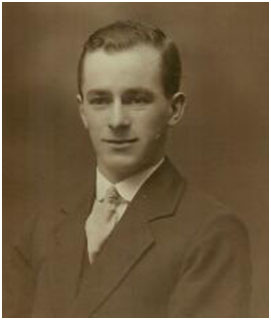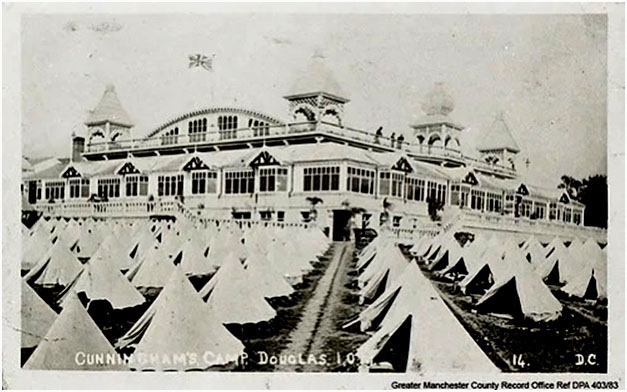[1st South-East Lancashire (Bantams)]

Billy Talbot (1896-1966) as a young man.
William Talbot, known as Billy, was born in Leigh on 2 June1896,
the eighth of ten children. Three of his sisters died in infancy; his
eldest brother James, at 5'5", had no difficulty enlisting in the
13th Bn Lancashire Fusiliers on 12 December 1915 and eventually saw
service in France with both the York & Lancaster Regiment and the
Durham Light Infantry;his elder brother Thomas (1894-1918) at 5'4"
was able to enlist in the Lancashire Fusiliers on 2 September 1914 but
was discharged 47 days later on medical grounds because he had flat
feet - but that did not deter him from subsequently enlisting in the
Manchester Regiment with whom he was posted missing, presumed dead on
25 March 1918 and subsequently recorded as killed in action;his younger
brother, Herbert (1899-1918), was also killed in action, with the 4th
Bn King's (Liverpool Regiment) on 11 October 1918. Before the war, Billy
worked for the Ena Spinning Company in Atherton, where he was a warehouse
boy and then a cop packer.
At 5'1", he attested with the 17th Bn Lancashire Fusiliers (Bantams)
on 2 January 1915 when he was 19years old. He spent the next 12 months
in England and the address in his Service New Testament in 1915 was
B Coy, No 9 Tent, 17th Lanc Fus, 104th Infantry Brigade, Marfield Camp,
Masham, Yorkshire. He went with the Battalion to join the BEF in France
at the end of January 1916 and they were soon involved in trench warfare.
The Battalion moved regularly and arrived in Arras at the beginning
of September 1916. The Calendar of Moves records a hostile raid on the
trenches by German troops on 26th November 1916 andthe Regimental History
records that 2 men were killed, 6 wounded and 25 taken prisoner. Billy
Talbot was one of those taken prisoner during the raid.
Unfortunately, Billy's attestation papers have not survived, but his
Discharge Folder and Red Cross Prisoner of War records provide a picture
of his time in captivity. A Detention Camp record sheet stamped 16 Dec
1916 records that he arrived at Camp Dülmen from Douai and a second
record sheet stamped 8 May 1917 records his arrival at Camp Münster
II from Dülmen. These two camps were quite close to each other
and his transfer may have been associated with an accident in March
1917 when a tree fell on him in the camp at Dülmen, crushing his
left shoulder, after which he was unable to work for a month. Billy
was repatriated to England on 2 December 1918 and his Disability Statement
of 9 February 1919 assessed his disability as 30%. A subsequent medical
examination on 18 December 1919 described his injury as "pain in
left shoulder, some slight creaking in left shoulder joint, movement
slightly stiff, slight wasting of deltoid", and the 'Opinion of
the Medical Board', used as the basis for assessing his pension, was
that this was attributable to service during the war, but the level
of disability was reduced to "less than 20%".
Billy's service of just over four years and his treatment as a prisoner
of war, left him unable to eat properly for the rest of his life. After
the war, he returned to Leigh at the age of 23 and married a young war
widow, Sarah Alice Jones (22) in Tyldesley on 15 November 1919. He was
not expected to live long at the time of his repatriation and he spent
some time in the Men's Home, Plas Mariandir, Deganwy, which was a magnificent
convalescent home built by the Manchester and Salford Hospital Saturday
and Convalescent Homes Fund and officially opened on 20 September 1919.
In its report of the opening of the Home, the Manchester Guardian reported
that "the majority of the inmates …are older men … of
the Manchester district, who are temporarily broken down in health and
require quiet rest".In 1921,Billy's occupation was given as mill
hand, cotton spinning, having returned to employment with the Ena Cotton
Spinning Company. However, on the night of the census, he was convalescing
at The Cunningham (tented) Young Men's Holiday Camp at Douglas in the
Isle of Man, while his wife and baby daughter were at home in Leigh.
He later worked as a newsagent and then moved to Morecambe where his
wife opened a boarding house with the prospect of sea air being beneficial
for his health. However, this venture eventually proved too much to
manage and they moved to Bolton where Billy became bedridden and his
wife worked in the cotton mills. He was confined to a bed at one end
of the downstairs living room of a small, terraced house where he died
in 1966 at the age of 70.
1 .At the start of the First World War, the minimum height
for soldiers was 5'3". The Bantam Battalions began to be formed
towards the end of 1914, specifically recruiting men below this height.
2 The History of the Lancashire Fusiliers 1914 - 1918: Volume
1, Major-General JC Latter CBE MC, Gale & Polden (1949)
John Murdoch, July 2022

Men's Home, PlasMariandir, Deganwy, Manchester and Salford Hospital Saturday and Convalescent Homes Fund Photo: H Foyn,Penmaenmawr

Dining Room and Tented Accommodation, Cunningham's Young Men's Holiday Camp, Douglas, Isle of Man.
